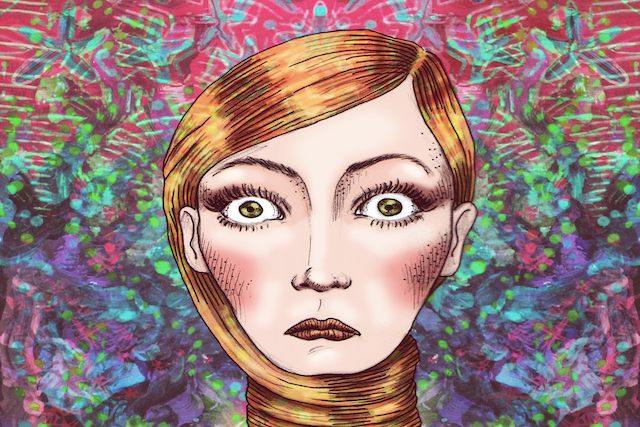
“If you always feel like you’re too much or too little, maybe you’re adding yourself to the wrong recipe.” ~Sophia Joan Short
There is an art to shrinking yourself.
As a young girl, I was painfully earnest. I hadn’t learned the craft of nonchalance that was as much a requirement for being liked as name-brand clothes and Livestrong wristbands. One day, as I chattered excitedly on the school bus home, my seat-mate scolded me: “Hailey. Calm down. You’re so annoying.”
This is how I learned that my enthusiasm made me unlikable.
At home, short tempers led to angry arguments. After conflicts, my dad would withdraw his love in a stormy silent treatment until I cleared the air—or until we both agreed to pretend that nothing ever happened. I learned the art of walking on eggshells. When I was fifteen, Dad and I got into an argument and didn’t speak for days. We orbited around each other like silent planets in a lonely solar system.
This is how I learned that my anger made me unlovable.
Years later, my first adult relationship began to unravel. I felt the pain of our withering love acutely. My then-partner withdrew further into himself with every argument, every tear, every dissonance. The more I tried to repair our broken love, the more distant he became.
This is how I learned that my needs would push away the people I loved the most.
Where did you learn that you were too much?
Were you bullied at school? Mistreated at home?
Did your caregivers say you were too loud, too energetic, too difficult? Did they neglect your interests, deny your feelings, or punish your anger?
Did your lovers withdraw their affection when you expressed your true feelings? Did they balk at your trauma? Did they hold you at arms’ length?
These experiences leave us with a resounding mantra:
I am too much.
I am too much.
I am too much.
But you are not. Here’s why.
The Beauty of “Too Much”
Those of us who give ourselves permission to feel deeply give ourselves the gift of fully participating in this world.
We embrace the vast palette of emotion that living demands. We experience the valleys of loss, the black pain of grief, and the jagged edges of trauma. We also experience the searing catharsis of inspiration, the rich colors of joy, and the deep, calm ocean of love.
Because we feel so richly, our hearts are calm harbors where others’ pain can seek refuge. We are empathetic and expansive, and when we say, “I hear you, I’ve been there,” we really mean it.
We do the hard labor of living, of feeling, every day. We have built within ourselves a powerful infrastructure for empathizing, connecting, and relating. This gives us a profound capacity to connect with others —others who are capable of meeting us there.
It’s Not About You
Every time someone implies that you are “too much,” they express their own limitations.
Emotional intensity scares those who have never learned to access their own emotions. If they don’t know how to feel their own pain, sadness, or joy, they will be incapable of handling it in others.
What they say is:
- “You’re being too dramatic.”
- “Do we always need to talk about our feelings?”
- “Everything’s fine. Why are you so upset?”
- “I can’t do this.”
What they are really saying is:
- “I am afraid of your pain because I do not allow myself to feel my own.”
- “I am afraid of your vulnerability because I never learned how to be vulnerable.”
- “I do not have the tools to handle conflict, so I will avoid it.”
- “I am afraid of failing because I don’t know how to take care of you.”
These folks have spent a lifetime erecting and fortifying walls to keep intense emotions out. They may have learned to do this as a coping skill. They may have been taught to by their caregivers. Regardless, as a result, they may push you away, withdraw, retreat, shame, criticize, or blame—anything to keep their walls intact.
Their judgments are a reflection of their own limitations, not a reflection of you. This does not justify the ways they’ve shamed you, but it may help you feel compassion for the fearful manner in which they’ve lived.
Alongside this compassion, you also have a choice.
Will you choose to shrink yourself to fit behind their stifling walls?
Or will you seek relationships with folks who embrace your capacity for feeling widely—ugly cries and happiness and all?
A Gateway to Wholeness
Despite my many efforts to become invisible, there was a woman within me who had fierce truths to speak, whose heart felt crushing pain and wild joy in equal measure. Repressing my true self was like trying to outrun the morning sun.
I wanted to be seen in all my wholeness, but I was terrified of being abandoned as I’d been before. I needed to learn—not through affirmations and visioning, but through action and supportive relationships with others—that I could be loved for who I was.
And so, I began to practice. I noticed which friends listened when I spoke. I noticed who validated my feelings and who glossed over them en route to their own stories. I noticed who welcomed me with open arms, even if I was feeling blue, tired, or anxious.
Romantically, I sought partners who acknowledged my needs instead of scoffing at them. Words like “dramatic” and “hysterical” became red flags I heeded without exception.
I sought partners who were forthright about their feelings for me—who matched my desire for verbal affirmations, physical touch, and time spent together. I still remember the shock I felt when I realized that there were lovers who wanted more time with me, more intimacy, more depth, instead of less.
Over time, my relationships became the safe containers within which I practiced wholeness. Qualities I forgot I’d had, like humor, confidence, and expertise, blossomed in these new, safe ecosystems.
Now that I’ve experienced the freedom of others’ acceptance, I have zero interest in pursuing relationships with folks who would deem me “too much.” As the saying goes: “You will be too much for some people. Those are not your people.”
—
Learning to embrace my wholeness is a daily practice. Some days are harder than others.
When I’m feeling anxious and seek comfort from my partner, sometimes a niggling voice whispers that he will leave me.
When I speak at length about a new endeavor, I occasionally fear that I’m boring my audience.
When I express grievances in my relationships, I cringe at the prospect that the recipient could throw up her hands and declare me “too much work.”
Every time I feel these fears and act anyway, I honor my innermost self. I am teaching myself—slowly, diligently, patiently—that I am worthy of expression and worthy of love. It gets a little bit easier every day.
About Hailey Magee
Hailey Magee is a Codependency Recovery Coach who helps individuals conquer people-pleasing, set empowered boundaries, and master the art of speaking their truth. She has worked with over 100 clients from the US, Canada, Ireland, France, South Africa, and more. Sign up for a complimentary consultation to learn how coaching can help you live from a place of authenticity and inner freedom. You can follow Hailey on Facebook and Instagram, or visit www.haileymagee.com.
- Web |
- More Posts












 Though I run this site, it is not mine. It's ours. It's not about me. It's about us. Your stories and your wisdom are just as meaningful as mine.
Though I run this site, it is not mine. It's ours. It's not about me. It's about us. Your stories and your wisdom are just as meaningful as mine. 